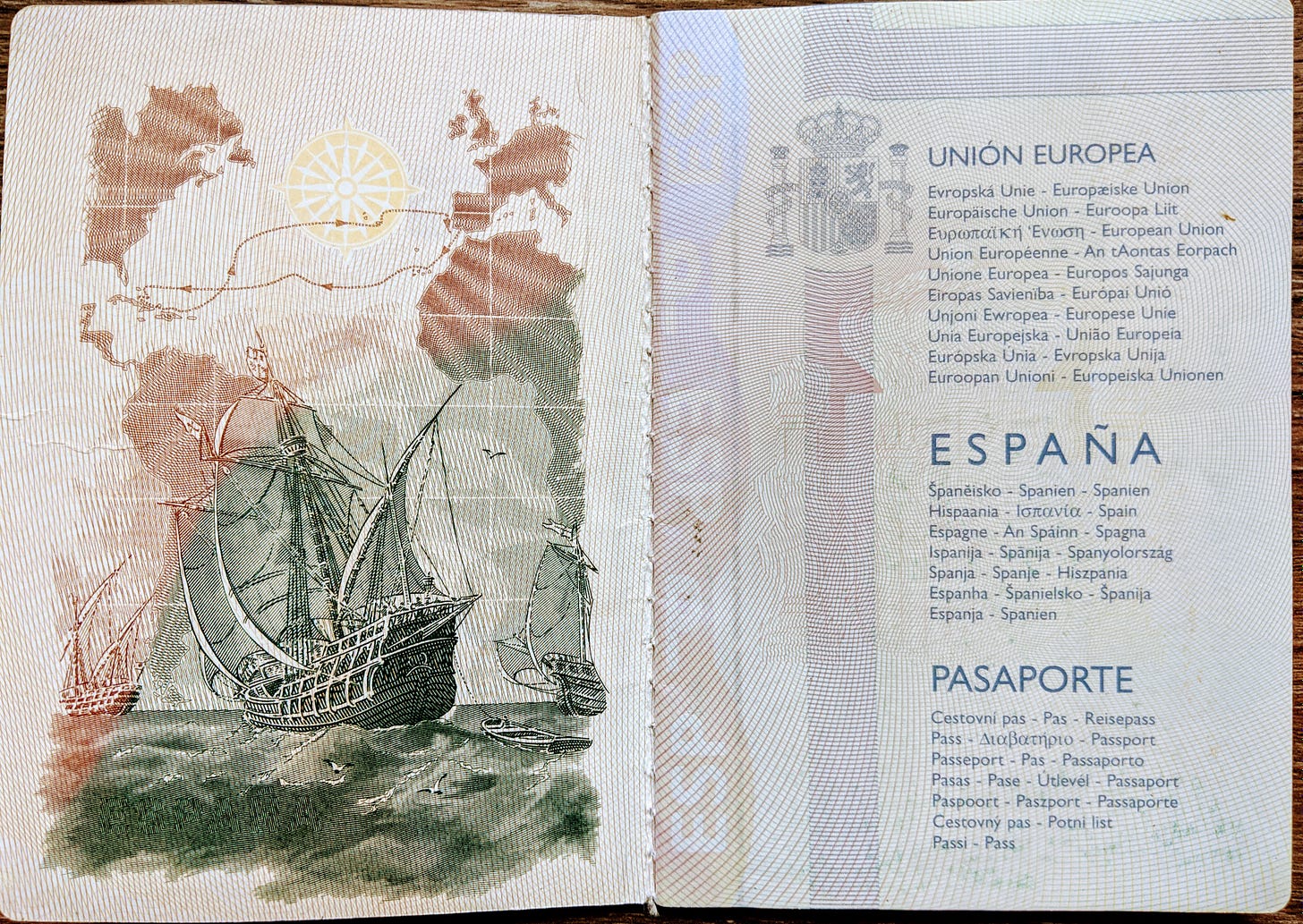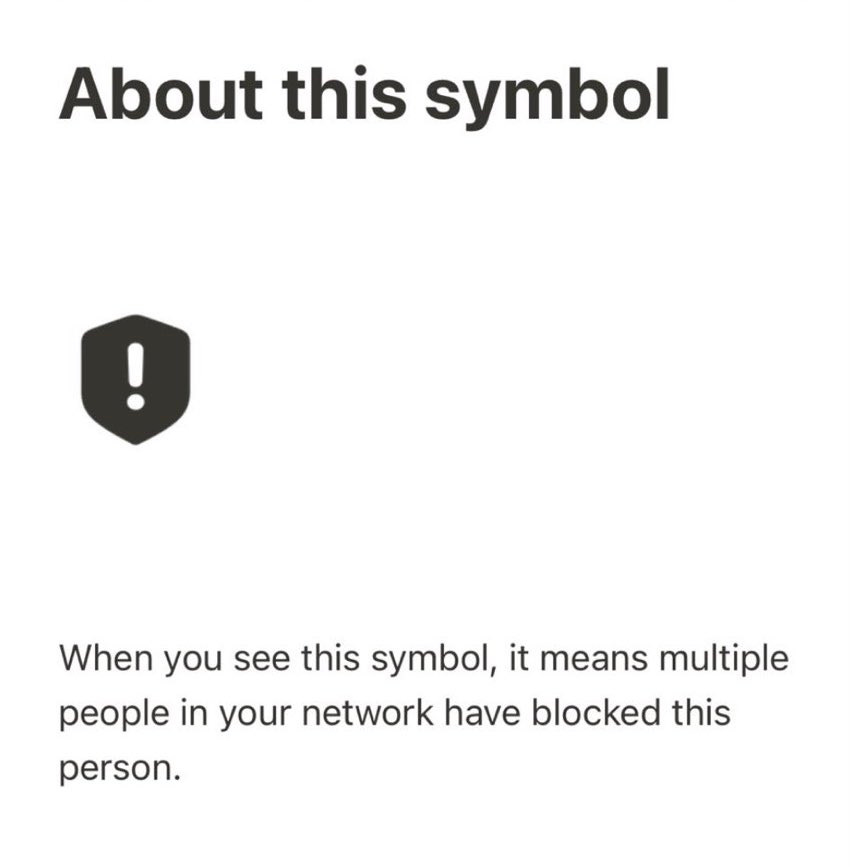
“A border—the perimeter of a single massive or stretched-out use of territory—forms the edge of an area of 'ordinary' city. Often borders are thought of as passive objects, or matter-of-factly just as edges. However, a border exerts an active influence.”
-Jane Jacobs, The Death and Life of Great American Cities
As someone with a modest Twitter presence that occasionally sees some virality, I’ve had the weird out-of-body experience of either being screenshot sub-tweeted or, even weirder, had my tweets quoted at me outside of Twitter (once by a co-worker during a Zoom meeting, and another time by my rabbi).
The latter is flattering if a bit awkward (they found my online persona!) but the former is typically hostile. For example, one of my spies sent me this recently:
If the UX looks familiar yet foreign, it’s because it’s ‘Telepath’, one of these splinter social media apps that’s thematically branched off from the Twitter-verse, and is apparently the chattering ground for progressive-minded users (Marc Bodnick, the OP, is the founder and creator of it).
Thankfully, this is about the maximum level of hostility online I see, and the reason is that I love blocking. Absolutely, unashamedly love it. My pinned tweet lays down the policy, like the disclaimer on the entrance to an amusement ride, and I religiously observe it, user beware.

Blockity-block-block: I block constantly and promiscuously. Like the reciprocating pistons on an internal combustion engine—BLOCK! BLOCK! BLOCK!—they slam away with every turn of the online crankshaft. I want a block grenade, nay, a block ICBM that levels entire cities of Twitter into what’s (from my POV) nothing but rubble-strewn ruin I can ignore forever.
I think I have almost every tech journalist blocked, a world that I once liminally inhabited, except a few I personally know. Almost everyone in the Disinformation Industrial Complex—that noisy scrum of camp followers that trail tech wherever it goes—save for a few personal acquaintances. It’s not spite, but complete indifference: I have zero interest in them or anything they’ll ever write or say, and wish the feeling were absolutely mutual.
Sadly, that is not the case, and whether it be Bodnick or someone like Taylor Lorenz, who never quite gets the hint around blocking, the leak of mutual acquaintances will always be there.
But with your block wall in place, you observe it at a comfortable remove. Typically, some kind follower will DM with the one-line message ‘FYI’ and then the link, just so that I know I’m being talked about. It’s as if you were to tell me that the Rumanian-language Moldovan newspaper Expresul de Ungheni panned my book in a review. I’d think: Hmm…how did I piss off the Moldovans? If my work Slack was slow right then, I might even click on it and chuckle at the Moldovans and their rage, and then go back to whatever I was doing before. Because while I really do wish the Moldovans the best, the reality is that their world—and this is in no way meant as a ding—has zero relevance to mine (as indeed mine likely also means nothing to theirs). And ditto every other sub-Twitter I’ve built a Great Block Wall around.
If you want an answer for the leading riddle of our time—why is it that in a media landscape where the individual consumer has never had more absolute control over who or what they read or watch are we more obsessed than ever with ‘content moderation’ and ‘misinformation’?—the answer is insufficient use of the block button. Every person you block is like a another brick in your frontier wall, defending you from the insane philosophies, inane prattlings, and bad-faith self-promotion of a world fracturing into mutually-hostile tribes no longer tethered to physical or cultural contours like political or linguistic borders. There’s no point in engaging with the foreign tribes, and you’re fooling yourself if you do.
Mind you, this is how it’s always been since time immemorial; it’s only recently that social media has swirled different epistemic universes in an unignorable way. Consider, as a more world-historical example, my Spanish passport. The very first page features an engraving of Columbus’ small fleet, along with a map showing the route of his first voyage to the Americas. Like the page on my American passport featuring the Voyager probe, I imagine the intent was to feature the bold, expensive bet, featuring the high-tech navigation of the time, that the country made in its glory days. And it’s not just on the passport: What Americans call ‘Columbus Day’ (and increasingly Indigenous Peoples’ Day) is in fact the Spanish national holiday, featuring military parades and fighter-plane flyovers with Spanish colors streaking across the sky.
My point is certainly not to re-adjudicate the endless debate around Columbus, but merely highlight a glaring point of narrative contention where an enormous well-documented historical process is nonetheless recounted in wholly different ways depending on what language you speak and education you received. And matters have remained that way for, oh, half a millennium or so now.
You could perform the same experiment—I did so myself back when I had the time to really read—via a side-by-side examination of a biography of Napoleon in French vs. English. To this day in texts intended for school children, Napoleon is glowingly described as having diffused the values of the revolution via civil reform throughout the conquered lands of le Grand Empire. The English, who until recently made the French arriving by train from Europe disembark in Waterloo Station, have a rather different view of les valeurs de la Révolution française.
Back inside the American Cold Civil War, it’s time for the final narrative split. I first wrote about this growing divide in 2018 for WIRED. Since then it’s gone from Rashomon Effect—a fancy term for describing the same event from different viewpoints—to living in alternative epistemic universes, where how we know what we know embodies completely different standards, sources, and modes of reasoning.
There is no reconciling these beliefs, nor any reason to, unless you aspire to some sort of narrative imperialism—here, I suspect the Americans are guilty—that requires every narrative to be changed to jibe with one’s own.
(Americans suffer from Roman Empire Syndrome: having never really seen the fringes of their intellectual horizons, they assume their every cock-eyed belief is in fact a universal one, and any alternative belief to be ridiculous or non-existent. The only narrative dislocation they suffer is internal to the their internecine conflict, which is why most American media has more or less forgotten the outside world even exists. Military coups in Myanmar are too far afield when there’s one apparently brewing internally.)
Each example cited above, however absurd some might seem to you, is a self-consistent narrative within the cosmos of signifiers it inhabits, allowing the human voices therein to navigate and describe their world in some coherent way. History put to political purposes has always been fake news, and nation-states defined themselves, in Ernest Renan’s memorable phrasing, by the parts of their history they collectively chose to forget.
Sharing the same warped view of reality is critical to tribal cohesion, and anyone with some epistemic humility (or less parochialism) will admit to accepting one collection of narratives over another rather than possessing a monopoly on capital ‘T’ Truth. Dullards, provincials, and scoundrels will of course maintain they alone possess God’s own truth.
Going back to the screenshot above: In that Telepath world where Bodnick reigns, I will forever be a ‘disingenuous putz’ to him and Joshua Shapiro (whoever that is). Though perhaps they can rethink their classification now that the Times has published a piece, from Vox’s founder no less, asserting that our politics have mostly become aesthetics. Meanwhile, in my world and my Signal groups, Bodnick will be the one-time mainstream VC who flipped out and became a full-time online political activist whose mania became so all-consuming he had to create a new social network to contain it all.
Napoleon: Bloody conqueror or social reformer? Antonio: Disingenuous putz or disagreeable contrarian? Bodnick: Bold progressive voice or guy with custom safe space? I know what the sign says in my neck of the woods, and that’s all I really care about. That Telepath group means about as much to me as a Moldovan newspaper (and I sincerely hope the Bodnick crew stops bothering with me since I block them all), and that’s how matters should stand.
Hold on, you’ll admonish, won’t giving up the shared intellectual project of narrative consensus jeopardize the very nation-state itself? Yes, undoubtedly. We are due for some trying times whose severity is only starting to become apparent. But we will be far better suited to creating whatever world comes after all this by accepting the fundamental fracture of society the new media is causing, rather than clinging to the nostalgic belief we can reforge the mass consensus of Cronkite or The Times, punctuating their pronouncements with And that’s the way it is! or All the news fit to print, and expecting a cohesive nation to believe it. We will never go back to that world, no matter how hard we try.
Right about now is when someone compares the Internet to the printing press, which is an apt, if facile-seeming comparison. There is indeed a deep historical analogy there—the printed flugschriften that heralded Luther’s Protestant revolution even resemble Facebook posts in their design—but the full implications here are often missed (perhaps for being too horrible to contemplate). The 16th and 17th centuries in Europe were ones of endless violence and turmoil where one world order was torn asunder with little in the way to replace it until well into the 18th century. If circa 1600 you’d asked your average German peasant if the printing press had been a good idea, they would have probably answered with a thunderous ‘no!’ (just as techno-pessimists nowadays question social media). We’d do better to accept that we’re embarking on a similar transformation right now, rather than let ourselves be blinded by nostalgia and caught by surprise when matters really reach a breaking point.
Let’s just hope our Thirty Years’ War is more virtual than physical.
Blocked from the Clubhouse!
Last week’s Official Thing To Freak Out About You’ll Be Forgetting About Next Week was the hullabaloo caused by journalists objecting to certain VCs blocking them on hyper-viral social media app Clubhouse. Greenwald narrates the whole sordid drama much better than I ever will, and I won’t be repeating the narrative here.
The key product point is that Clubhouse’s implementation of blocking means that if Alice blocks Bob, and Alice speaks on a panel, then Bob can’t join the room. In the single-threaded Clubhouse UX where (usually) a dinner-table’s worth of guests are on stage, this means that a strategic portfolio of guests can block whole swathes of users from listening. Yes, it’s somewhat aggressive, but if you think about it, it’s not terribly different from the informal ‘blocking’ rules that reign for IRL social events: you know not to invite the two enemies or former partners to the same event to avoid awkwardness all around.
The irony is that the same journalists who kvetched about Clubhouse’s shiftlessness in the face of supposed harassment and clamored for tools like blocking, found themselves duly blocked. I never thought *I* would be blocked, wails the person who voted for the Block Button Party.

But why are the journalists are so, so freaked out about this, to the point that even those who’ve done very well in the digital age are penning indignant tweets about it. Forget the tired cant about ‘accountability’ or ‘speaking truth to power’—which is usually about speaking power to truth: what’s eating the scribblers?
For one, the journalists are suddenly discovering that they’re widely disliked, and their presence on promising media platforms that feature unprecedented candor from big names isn’t exactly welcome. Clubhouse goes as far as pinning them with a scarlet letter, or rather a grey exclamation point, as the Mark of People Widely Blocked. Who needs some busybody narc at the wild party who’ll leak the juicy details in the name of ‘accountability’ or some other tired, self-flattering canard? Nobody.
Journalists are pissed off about more than just the cool-kids-party FOMO though. After all, every really good CH room has spillover rooms where the audio is streamed and most end up on Youtube. They can always listen to the proceedings anyhow.
No, the real issue here goes back to what Daniel Boorstin described in his extraordinarily prescient 1962 (!) book The Image: A Guide to Pseudo-Events in America. The exemplar of the eponymous pseudo-event is what’s perhaps now almost archaic-seeming, but was at one point novel and weird enough to write a book about: that social fabrication called the press conference. Now replaced by other pseudo-events like viral TikToks, press conferences were the first events convoked that did nothing other than convert themselves into widely-disseminated media. There was no decision taken, religious ceremony conducted, or even a sporting event held: it was pure social theater masquerading as human endeavor.
To rewind ourselves to the pre-Internet age for a sec, consider that journalists were once enjoined to be present at real events that actually happened, like Robert Capa actually disembarking with the GIs at the Normandy beaches (rather than our current journalists who liken covering Trump to that very same act). The role of journalists in the pre-smartphone age was to be the living eyes and ears for the readership when the virtualization of experience was slow and analog, if possible at all. Capa lost almost all of the photos he took, leaving fewer than a dozen actual photos of that momentous event; to get anything like a real-life account of great events was a feat of both bravery and clunky technology.
Fast forward a TV decade or two, and pseudo-events became the original LARPs where nothing actually happened in any real sense, but that were known for being known about (eg. the Academy Awards). The modern-day celebrity, someone known for their well-known-ness, is of course the obvious human extension (the influencer being merely the decentralized media version of the same).
The ability to anoint a gathering as a pseudo-event, or a performer as a celebrity, has long been the exclusive (and valuable) monopoly of journalists and various media professionals. As Boorstin wrote: “The power to make a reportable event is thus the power to make experience.” To cede control of that baptismal rite to anyone who can muster an audience is dinosaur-staring-at-asteroid levels of discomfort and cognitive dissonance, which the journalists displayed to full effect in the face of Clubhouse.

What was the biggest media event in tech in the past two weeks? Elon Musk going on Sriram Krishnan’s and Aarthi Ramamurthy’s Clubhouse show, and drilling the CEO of Robin Hood about the GameStop fracas. Ditto when Mark Zuckerberg made his own appearance. Nothing else even compared. And not only were journalists not there to bless it….they weren’t even let in the (virtual) doors! Journalists were never players in the world of real human striving, merely the emcees, but with Clubhouse-style blocking, they’re not even among the the audience….they’re left with their noses pressed against the glass looking in. Sucks for them and their historical business model, but their high moral dudgeon about it is more than a bit ridiculous.
It’s frankly an authoritarian impulse to feel one has the moral right to record everything, even matters that are not historical events. Sorry members of the Fourth Estate, but Elon having a conversation with Sriram and Aarthi is not a news event; Elon landing rocket on its ass on an ocean barge is (something SpaceX does regularly now). Clubhouse rooms are indeed pseudo-events, though very captivating ones, and you don’t have exclusive license over them anymore. If you wander over to where the action is and find yourself facing the wrong side of a block wall, consider what led to that rather assail the motivations of the wall’s builder.
My life online has never been better behind the block wall, but even my walled garden is only a sort of quasi-private backyard. The real action is indoors in truly private spaces like Signal groups. I haven’t actually Tweeted or spoken public in any unfiltered way for years, and neither has anyone I really engage with online. Live long enough on the Silicon Valley fringe and you’ll see your lifestyle repurposed (years later) by legacy media in whatever moral panic they’re milking that moment. To people with bylines, everything looks like an editorial problem, and guess who’s editor-in-chief?
If the animating spirit of the First Amendment and free speech isn’t enough to keep ‘unfettered conversations’ alive in this country, perhaps the defensive spirit of the Fourth Amendment and trespass will. The block wall is like the fence around your property that keeps the nosy reporters (or anyone else) outside, whatever their supposedly noble motives, and free speech inside. Go and build it.
Subscribers!
The next Pull Request interview is with Lambda School founder and CEO Austen Allred, one of the most interesting (and outspoken) figures in higher education today. Interview out next week.








I liked the post a lot...Enjoyed some of the literary allusions and was totally lost on others...Found at least one typo and was reminded of my high school teacher (a Benedictine priest no less) yelling to us "We shall have no internecine strife..."
One other point: We were told by the county attorney that as public officials we could not legally block readers....What a crock of caca! Let's do lunch soon...
enjoyed the read, thanks. i hope you're wrong and we can go back to some baseline cultural consensus, but it's trending in the wrong direction.